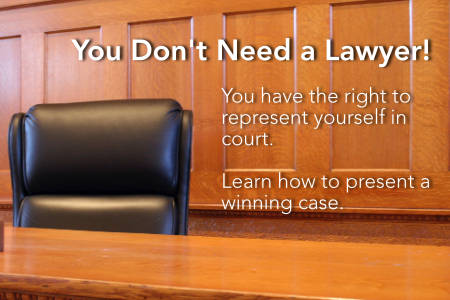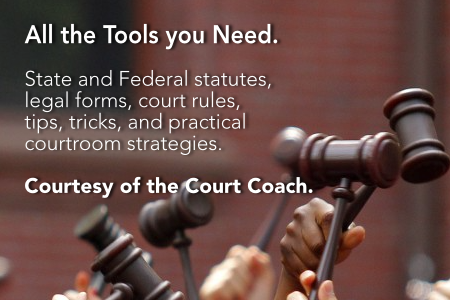The Law is Free. Lawyers Aren’t.
The Court Coach is a FREE resource for anyone looking to serve as their own lawyer, whether in or out of court. Here you’ll find just about everything you’ll need – rules, forms, legal dictionaries, and useful tips and tricks from attorneys and fellow litigants. Research how to file or defend a claim in your local small claims court. Find and download contracts, corporate forms, wills, trusts, and just about any other legal document you may need.
- File or defend a lawsuit in small claims court.
- Research the law and arm yourself with knowledge.
- Learn how to handle yourself in court.
- Download any form you need.
- Post a question in our forum.
- Get free advice from lawyers and fellow litigants
- File your own Chapter 7 bankruptcy.
- Share your experiences.
Personal injury law is called “tort law.” In a nutshell, a tort is any act which wrongfully causes someone else to suffer loss or harm. The person who undertook the act is called a “tortfeasor,” and is legally responsible (or “liable”) for the damages that may result. Because the overwhelming bulk of personal injury cases stem from accidental injuries, this article is going to focus on those types of torts. This area of tort law is commonly called negligence, which comes from the Latin term negligentia, which means neglect (literally “not to pick up something”). The legal definition of negligence is a failure to exercise the care that a reasonably prudent person would exercise in like circumstances. Negligence involves harm caused by carelessness, not intentional harm. Read More…
A contract is a promise to do something in exchange for someone else’s promise. The difference between a contract and any other promise is that contracts are promises enforceable in a court of law if they’re breached. To be legally binding as a contract, a promise must be exchanged for adequate consideration, which is a benefit or detriment that a party will receive in connection with the agreement that induces them to make the promise.
Contracts are are governed by three sets of laws. Statutory law (laws that are passed by state and federal governments), common law (laws based on court cases), and private law, which is more commonly known as “law of the contract.” Read More…
Bankruptcy comes in six different forms, which are given the names of the chapters of the US Bankruptcy Code that describe them.
Chapter 7, entitled “Liquidation,” is a procedure in which the trustee takes over the assets of the debtor’s estate, reduces them to cash, and “liquidates” them by distributing them to creditors (subject to the debtor’s right to retain certain exempt property). Chapter 7 is really for those who have no non-exempt assets to distribute, in which case there is no liquidation. These cases are called “no-asset cases.” An unsecured creditor will only receive a payment if the case is an asset case. Learn More…
The term “criminal law” is generally defined as body of rules and statutes that defines conduct prohibited by the government because it threatens and harms public safety and welfare. In addition to defining and prohibiting such conduct, criminal statutes describe the punishments to be imposed for engaging in criminal activity. Although there are some common law crimes, most crimes in the United States are established by local, state, and federal governments. Criminal laws vary significantly from state to state. Learn More…
Here you will find an explanation of how each type of business entity operates, together with the rights, duties, and obligations of each officer, director, and shareholder. Learn More…
Recommended Reading
CYA Announcement
Any and all information contained on this website is provided for informational purposes only, and should not be construed as legal advice on any subject matter. The information provided is general in nature may not reflect current legal developments, including federal and state legislation, administrative rules, and precedents.
In the event you submit a question or comment on our forum, any responses should not be construed as legal advice. The Court Coach shall have no liability whatsoever based on any actions undertaken by visitors based on information contained on this website.









